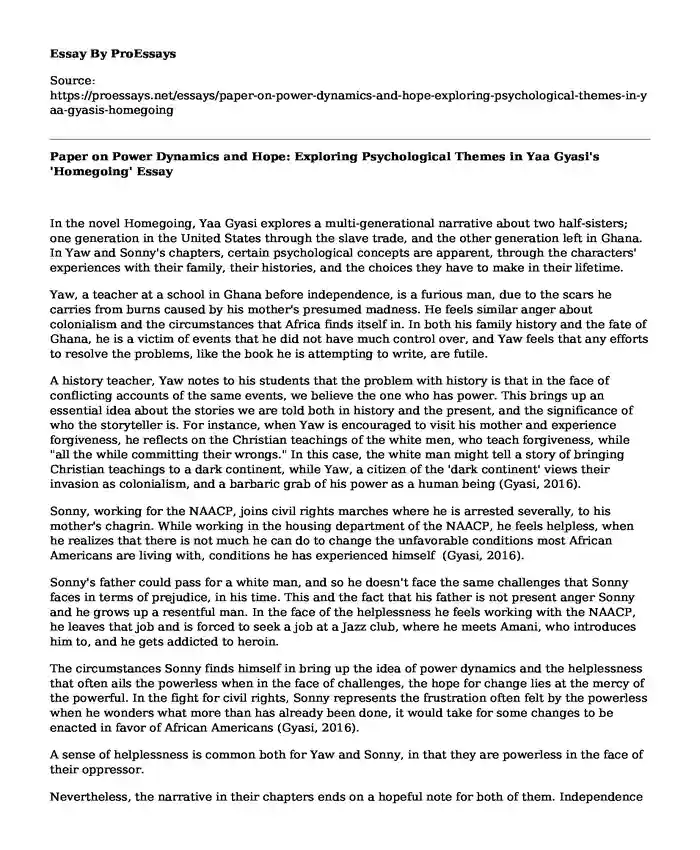In the novel Homegoing, Yaa Gyasi explores a multi-generational narrative about two half-sisters; one generation in the United States through the slave trade, and the other generation left in Ghana. In Yaw and Sonny's chapters, certain psychological concepts are apparent, through the characters' experiences with their family, their histories, and the choices they have to make in their lifetime.
Yaw, a teacher at a school in Ghana before independence, is a furious man, due to the scars he carries from burns caused by his mother's presumed madness. He feels similar anger about colonialism and the circumstances that Africa finds itself in. In both his family history and the fate of Ghana, he is a victim of events that he did not have much control over, and Yaw feels that any efforts to resolve the problems, like the book he is attempting to write, are futile.
A history teacher, Yaw notes to his students that the problem with history is that in the face of conflicting accounts of the same events, we believe the one who has power. This brings up an essential idea about the stories we are told both in history and the present, and the significance of who the storyteller is. For instance, when Yaw is encouraged to visit his mother and experience forgiveness, he reflects on the Christian teachings of the white men, who teach forgiveness, while "all the while committing their wrongs." In this case, the white man might tell a story of bringing Christian teachings to a dark continent, while Yaw, a citizen of the 'dark continent' views their invasion as colonialism, and a barbaric grab of his power as a human being (Gyasi, 2016).
Sonny, working for the NAACP, joins civil rights marches where he is arrested severally, to his mother's chagrin. While working in the housing department of the NAACP, he feels helpless, when he realizes that there is not much he can do to change the unfavorable conditions most African Americans are living with, conditions he has experienced himself (Gyasi, 2016).
Sonny's father could pass for a white man, and so he doesn't face the same challenges that Sonny faces in terms of prejudice, in his time. This and the fact that his father is not present anger Sonny and he grows up a resentful man. In the face of the helplessness he feels working with the NAACP, he leaves that job and is forced to seek a job at a Jazz club, where he meets Amani, who introduces him to, and he gets addicted to heroin.
The circumstances Sonny finds himself in bring up the idea of power dynamics and the helplessness that often ails the powerless when in the face of challenges, the hope for change lies at the mercy of the powerful. In the fight for civil rights, Sonny represents the frustration often felt by the powerless when he wonders what more than has already been done, it would take for some changes to be enacted in favor of African Americans (Gyasi, 2016).
A sense of helplessness is common both for Yaw and Sonny, in that they are powerless in the face of their oppressor.
Nevertheless, the narrative in their chapters ends on a hopeful note for both of them. Independence is coming upon Ghana, just as freedom is coming upon Yaw when he visits his mother and learns more about his history from the account of one who knows the circumstances. Sonny, at the end of his chapter, stays with his mother when the option is presented, instead of going back to Amani and the addiction she represents for him.
Despite the powerlessness both characters had felt at the feet of their families, histories, and circumstances, it turns out that in the end, the choices they make will change their circumstances for the better.
References
Gyasi, Y. (2016). Homegoing. New York: Alfred A. Knopf.
Cite this page
Paper on Power Dynamics and Hope: Exploring Psychological Themes in Yaa Gyasi's 'Homegoing'. (2024, Jan 25). Retrieved from https://proessays.net/essays/paper-on-power-dynamics-and-hope-exploring-psychological-themes-in-yaa-gyasis-homegoing
If you are the original author of this essay and no longer wish to have it published on the ProEssays website, please click below to request its removal:
- Critical Essay on Similarities between Antigone in "Antigone" and Nora in "A Doll's House"
- Distress and Depression in Diabetic Persons and Their Relationship With Self-Care Practitioners in Barbados
- Books Written by Emily Mandel Paper Example
- Essay Example on Nurse Burnout: A Global Professional Challenge Affecting Patient Safety
- Essay Sample on Early Intervention Needed for Kids with Autism, Mental Illness
- Essay Example on The Yellow Wallpaper: A Journey of Mental Freedom
- Essay Sample on 'Beauty Standards': A Bane for Women's Mental and Physical Health







